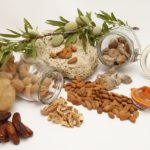Sometimes You Feel Like a Nut…and it’s Okay
I think nuts sometimes get a bad rap, and it’s not fair. Nuts of all varieties (almonds, pecans, walnuts, etc.) and seeds (pumpkin, sesame, flax, sunflower) contain protein and therefore provide us with energy. Peanuts are technically not a nut, but a legume.
Nuts and seeds contain mono- and polyunsaturated fats, fiber, folate (a B vitamin), vitamin E, magnesium and potassium. They also contain phytosterols—plant-derived compounds that are similar in structure and function to cholesterol.
Phytosterols actually compete for absorption with cholesterol in the digestive tract, thereby inhibiting the intestinal absorption of cholesterol.
How does all this translate to health? If we are snacking on nuts, we are not snacking on foods  that may cause more harm than good, such as candy and fried chips.
that may cause more harm than good, such as candy and fried chips.
A daily intake of nuts/seeds of 1.5 ounces, which is equal to about 3 Tablespoons or a handful, may reduce the risk of heart disease, improve cholesterol levels, and lower the risk of developing type 2 diabetes.
Since different nuts provide different benefits, it is good to vary the kind of nuts we consume. Raw, unsalted nuts are the preferred choice. Store in the refrigerator to maintain freshness and keep them from becoming rancid.
And remember, too much of a good thing is not so good. A handful of nuts each day is plenty, especially when trying to lose weight.
Snack idea: mix several varieties of nuts and seeds with a bit of dried fruit and/or dark chocolate chips (the idea here is to keep the sugar content low) as your customized trail mix. Portion it out into small bags or containers that you can take on the go.
“One secret of life is that the reason life works at all is that not everyone in your tribe is nuts on the same day. Another secret is that laughter is carbonated holiness.” –Anne Lamott


